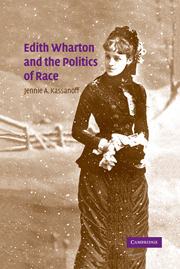Book contents
- Frontmatter
- Contents
- Acknowledgements
- Introduction
- 1 Invaders and Aborigines: playing Indian in the Land of Letters
- 2 “The real Lily Bart”: staging race in The House of Mirth
- 3 “A close corporation”: the body and the machine in The Fruit of the Tree
- 4 The Age of Experience: pragmatism, the Titanic and The Reef
- 5 Charity begins at home: Summer and the erotic tourist
- 6 Coda: The Age of Innocence and the Cesnola controversy
- Notes
- Bibliography
- Index
Introduction
Published online by Cambridge University Press: 22 September 2009
- Frontmatter
- Contents
- Acknowledgements
- Introduction
- 1 Invaders and Aborigines: playing Indian in the Land of Letters
- 2 “The real Lily Bart”: staging race in The House of Mirth
- 3 “A close corporation”: the body and the machine in The Fruit of the Tree
- 4 The Age of Experience: pragmatism, the Titanic and The Reef
- 5 Charity begins at home: Summer and the erotic tourist
- 6 Coda: The Age of Innocence and the Cesnola controversy
- Notes
- Bibliography
- Index
Summary
The study of Edith Wharton's politics raises a number of challenges for the feminist scholar. Unlike Ezra Pound, whose conservatism has, in recent years, stimulated a wealth of critical controversy, Wharton's pedigree – her upbringing in a fashionable New York family of Dutch and English origin – has given many license to see her conservatism as a birthright, and her politics as less a site of deliberate forethought than a consequence of elite inheritance. Although Pound's dramatic espousal of “a virulently anti-democratic and elite egoism” has, in the words of Cary Wolfe, forced contemporary critics “either to bury or to praise” him, Wharton's conservatism, until now, has stimulated little critical attention (Wolfe 26). Indeed, many critics have taken a don't-ask-don't-tell approach to Wharton's conservatism. Even when her politics are faintly acknowledged, Frederick Wegener remarks, they tend to be “either neutrally presented and illustrated, or awkwardly defused, or reconceived on some more agreeable basis” (“Form” 134). In consequence, Wharton has become the May Welland of American letters. Like the genteel but underrated bride in The Age of Innocence (1920), she has been mistaken for a naïve and cosseted socialite, “so incapable of growth, that the world of her youth had fallen into pieces and rebuilt itself without her ever being conscious of the change” (Wharton, The Age of Innocence 290).
- Type
- Chapter
- Information
- Edith Wharton and the Politics of Race , pp. 1 - 7Publisher: Cambridge University PressPrint publication year: 2004

